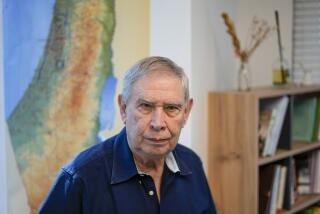U.S. Sees Turn Toward Reform in New Faces
WASHINGTON — The sweeping purge of hard-line officials launched by Soviet President Mikhail S. Gorbachev and Russian leader Boris N. Yeltsin turns Moscow sharply toward reforms long espoused by the United States, President Bush and other U.S. officials said Friday.
Bush, assessing Gorbachev’s actions from his vacation home in Kennebunkport, Me., said the latest appointments “appear to be moving towards the objectives of United States foreign policy and, in the process, towards democracy, freedom (and) self-determination.”
Other officials, who had complained Thursday that Gorbachev’s initial appointees were as bad as the coup leaders they replaced, described the new faces in phrases such as “quite liberal and progressive . . . pro-reform . . . supporter of individual rights and due process.”
The revised roster clearly demonstrated the growing influence of Russian Federation President Yeltsin. In fact, non-government analysts said Yeltsin probably dictated Gorbachev’s reversal, although they noted that the Bush Administration’s complaints probably played a role as well.
“They listened to the good advice from Maine,” said Helmut Sonnenfeldt, a former State Department and National Security Council expert on Soviet policy.
Most significant, in the view of U.S. experts, were the appointments of former Interior Minister Vadim V. Bakatin as head of the KGB and air force commander Col. Gen. Yevgeny I. Shaposhnikov as defense minister. Both are regarded as progressives and, perhaps more important, both supplanted Communist hard-liners who had been named to the posts Thursday.
Bakatin replaced KGB boss Vladimir A. Kryuchkov, one of the leaders of the abortive coup. In the process, he shoved aside Leonid V. Shebarshin, a Kryuchkov protege, who had been named to the post Thursday. Late last year, Bakatin lost his post as head of the powerful Interior Ministry, which controls police functions throughout the Soviet Union, when Gorbachev lurched to the right to appease hard-line critics.
Shaposhnikov, an outspoken opponent of the coup, succeeds coup plotter Marshal Dmitri T. Yazov as defense minister. On Thursday, Gorbachev had selected Gen. Mikhail A. Moiseyev, chief of the general staff, for promotion to minister. The Moiseyev appointment was particularly disturbing to American observers because of what they said was the army chief’s ambiguous response to the putsch.
Moiseyev not only lost his promotion, he was replaced as chief of staff by Col. Gen. Vladimir Lobov, former chief of staff of the now-defunct Warsaw Pact military alliance and a leading military theorist.
Other new appointments included Viktor P. Barannikov, police chief of the Russian republic, to the position of interior minister, and Lt. Gen. Pavel Grachev, commander of an airborne division that opposed the coup, to be deputy defense minister.
Barannikov succeeded coup-plotter Boris K. Pugo, who committed suicide after the putsch failed. On Thursday, Gorbachev had given the job to Vasily Trushin, Pugo’s deputy. Barannikov was named to the Russian republic post in 1989, replacing Trushin, who was fired by Yeltsin.
When the revised appointments, along with the dismissal of Foreign Minister Alexander A. Bessmertnykh, were announced Friday morning, Bush imposed a blanket gag order on Administration officials in an apparent effort to avoid the appearance of U.S. meddling in Soviet internal affairs.
“Let them sort it all out,” he told reporters on the golf course near his vacation home in Kennebunkport.
In an official White House statement issued in response to queries about the extraordinary overhaul in the Kremlin, spokesman Marlin Fitzwater echoed the President’s words, describing the changes as “an internal matter on which we will not comment.”
White House aides were emphatic in fending off further requests for clarification.
“You got the statement,” one official said, “and the statement is ‘No comment’.”
The Administration’s reticence Friday was in stark contrast to its actions Thursday, when officials made no secret of their objections to Gorbachev’s appointments.
Eventually, however, Friday’s news from Moscow proved too positive for Administration officials to keep quiet about. Some officials offered private assessments of the appointments. Bush, himself, broke his own rule later in the day after playing another round of golf, describing the personnel changes as a clear move in the right direction.
Bakatin, 53, is the best-known of the new appointees to Western officials. He had never before served in the KGB, an organization that usually--although not always--promotes its chiefs from within.
“He is going to shake up the KGB,” one U.S. official predicted. “They are going to be aware right away in the KGB that he will act in accordance with the law. He supports Western-style guarantees of individual rights and due process. A lot of the cowboys will be out of there. He has the respect and clout that will be necessary to reorganize and refashion the KGB.
“He is a member of the Soviet establishment, but also a critic of it,” the official continued. “He has worked within the system, but on his own terms. That cost him his post as interior minister when the Gorbachev regime turned to the right in late 1990.”
Bakatin ran against Yeltsin in the Russian presidential election, finishing a poor third. His candidacy, however, apparently did not incur the animosity of Yeltsin, whose approval was clearly required for the latest batch of appointments.
Shaposhnikov’s appointment as defense minister was unusual because the air force has long been a junior partner to the army in the Soviet military establishment. However, Shaposhnikov, 49, was a clear opponent of the coup, while Moiseyev played an ambiguous role.
“He can be expected to move toward a smaller, more professional military, with an emphasis on technology and training,” one U.S. official said.
Shaposhnikov’s first acts in his new position were to announce his resignation from the Communist Party and to call for the dissolution of political organs in the military.
In a recent interview with a Soviet publication, Shaposhnikov said: “We must introduce common sense to organizational and staff structures, renounce the old dogmas and complexes . . . and improve combat hardware. But the most important thing is the individual . . . the priority must be people.”
Barannikov, 50, is a Yeltsin protege.
“Under him, it is likely the Interior Ministry will be depoliticized,” one U.S. official said. “He will aim to improve its effectiveness as a crime-fighting unit instead of an instrument of internal repression. He has been involved in police work since 1961.”
Lobov, 55, is a former deputy chief of the general staff. But he is best known in the West as a theoretician. He has long been concerned with predicting the sort of weapons that will be used in future wars.
“He has a solid reputation as a defense intellectual,” a Pentagon official said. “Lobov may be more liberal than some of the things he has written would indicate” because his writing had been supervised by his hard-line superiors.
Grachev, the new deputy defense minister, clearly came to the attention of Gorbachev and Yeltsin when he ordered his paratroop command to defect to the coup opponents. A highly decorated soldier, he served as a division commander in Afghanistan, where the Soviet Union sent troops to support Marxist governments from 1979 to 1989 against Muslim guerrillas.
More to Read
Sign up for Essential California
The most important California stories and recommendations in your inbox every morning.
You may occasionally receive promotional content from the Los Angeles Times.










